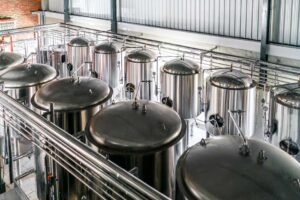Contents
The Benefits of Insulating Industrial Tanks
Industrial facilities rely on efficient processes, reliable equipment, and strict temperature control to keep operations running smoothly. One area that plays a surprisingly large role in overall performance is industrial tank insulation. Whether a facility stores chemicals, fuels, water, asphalt, food products, or other temperature-sensitive materials, properly insulating storage tanks can offer immediate and long-term benefits.
Industrial tank insulation is designed to maintain stable internal temperatures, reduce energy loss, protect sensitive materials, and support the overall health of processing systems. While every facility has unique requirements, the advantages of insulating tanks are consistent across nearly every sector.
Improved Temperature Stability
Many industrial materials must be kept within a specific temperature range to prevent thickening, freezing, or chemical changes. Insulation helps maintain consistent temperatures by minimizing heat transfer between the tank’s contents and the surrounding environment. For operations that rely on heated tanks—such as asphalt plants or chemical processing facilities—proper insulation reduces the amount of energy needed to keep products at usable temperatures.
Reduced Energy Consumption
Heating and cooling costs are among the most significant expenses in industrial environments. Without insulation, tanks lose substantial amounts of heat, forcing equipment to work harder and consume more energy. Industrial tank insulation dramatically slows heat loss, helping facilities reduce operational costs. Over time, the savings can far outweigh the initial installation investment.
Protection Against Condensation and Corrosion
Uninsulated tanks often attract condensation, especially in humid or fluctuating climates. Moisture buildup on tank surfaces can lead to corrosion, rust, mold, and premature equipment failure. By providing a protective thermal barrier, insulation helps reduce condensation and extend the lifespan of tanks and external components.
Greater Safety and Compliance
Temperature extremes can cause expansion, contraction, and pressure changes within storage tanks. Insulation helps regulate these fluctuations, creating a safer operating environment. In many industries—particularly petrochemical, food processing, and manufacturing—proper insulation also supports regulatory compliance related to energy efficiency and worker safety.
Operational Efficiency and Reliability
When tanks maintain their intended temperature range, processes become more reliable. Pumps work more efficiently, materials flow more smoothly, and equipment experiences less wear and tear. This often results in fewer unplanned shutdowns, lower maintenance costs, and improved production output.
Enhanced Environmental Performance
Reducing energy waste is not just good for operational budgets; it also supports sustainability objectives. Facilities that use industrial tank insulation contribute to lower greenhouse gas emissions by decreasing the amount of energy required to heat or cool stored materials.
Final Thoughts
Industrial tank insulation may seem like a behind-the-scenes detail, but it plays a critical role in efficiency, safety, and long-term asset protection. With growing energy demands and tighter industry standards, more facilities are recognizing the value of insulating their storage tanks to improve performance and reduce costs.








